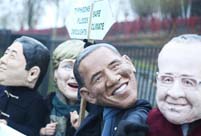A Chinese word, tuhao, has found special mention on the BBC recently for its widespread use in online conversations. The British broadcaster explains it to mean "nouveau riche", but everyone in China knows it means so much more than that.
It describes newly rich yokel tycoons who have worked their way up from the ground, yes, but it is also used to describe things considered particularly kitschy, including the gold iPhone 5S pushed out recently in a not-so-subtle rainbow of colors.
It describes unrestrained consumerism, especially those outside designer stores in Hong Kong, Paris or Milan and in flagship stores in Switzerland where timepieces are carted off by the dozens.
Tuhao. There is a slightly derogatory tone to the term, a hidden sneer manifested in usage.
But I believe that the Chinese tuhao himself is a transitional character, a temporary apparition of social changes, and that in previous reincarnations he was variously American, Singaporean, South Korean and even Japanese.
In the '60s and '70s, the strength of the US dollar allowed rich and not-so-rich Americans to flood tourist destinations everywhere clad in cameras, florid Hawaii shirts, rhinestone-fringed sunglasses and drawing attention with loud laughs and louder conversations.
The brash reputation persisted, and up till today, tourist surveys still mention the "Ugly American" abroad, although Fanny Mae and Freddie Mac may have conspired to keep him more at home in recent years.
In the 1980s, Asia's little dragons hoarded the financial headlines and tourists from Singapore, Taipei and Seoul headed out to see the world, pockets lined with ready cash from the regional economic booms.
Singaporeans, fresh from a greenhouse culture, complained loudly about any service that was not as sanitized as those back home, ranging from food to toilets to how tourist attractions are run, and to why other ethnic Chinese do not speak their brand of English or Chinese.
Already, they were preparing to teach the world how to do it better.
About the same time, farmers around Taipei were hugely compensated for land as the city expanded and needed more space. Suddenly, they found themselves with a little more money than they knew what to do with. They headed out as well, sealing a reputation that still stings despite the fact that their sons and daughters have now learned better manners.
They were really the first generation of the Chinese tuhao, although the term was not quite invented and in popular use yet.
As a wise old Chinese saying goes: It takes the first generation to get the money, the second generation to keep the money, and the third generation to appreciate the money. Some even say it takes four generations for the nouveau riche to upgrade to gentility, something money cannot buy.
In comparison, Japanese and South Korean tourists abroad eager to spend their money were much better behaved, frightening only in their precisely organized numbers and their insistence in taking photographs of everything lying across their paths.
Language differences added to their unfamiliarity and it took awhile before shopkeepers adapted and even Harrods of London had shop girls who spoke fluent Japanese or Korean.
Shopkeepers are catering to the Chinese mainland tuhao as well. Apart from diligently learning Putonghua, the shops in Hong Kong's Tsimshatsui, for example, bring out all the bling power they possess. On a recent trip, I had to wear sunglasses to shut out the glare from the shop windows.
The Chinese tuhao is only a younger brother who has yet to know better and the only thing truly intimidating about the tuhao is how many there are and will be. With a huge population that's still largely rural, it may really get worse before it gets any better.
After all, it may take a few generations to take out the yokel, and leave the tycoon.
 Finland has more eggs in the Chinese basket than any other
Finland has more eggs in the Chinese basket than any other In pictures: PLA's digital equipment
In pictures: PLA's digital equipment  Protesters demonstrate during UN Climate Change Conference in Poland
Protesters demonstrate during UN Climate Change Conference in Poland  Self-made farmer billionaire donates 69 villas at hometown
Self-made farmer billionaire donates 69 villas at hometown Demolition of bizarre rooftop villa in Beijing still in progress
Demolition of bizarre rooftop villa in Beijing still in progress Service seminar for E China train attendants
Service seminar for E China train attendants  Supermodel-turned-designer
Supermodel-turned-designer Cheerleaders light up CBA regular season
Cheerleaders light up CBA regular season  Finland--anytime you want is right time to go: Ambassador
Finland--anytime you want is right time to go: Ambassador Maritime counter-terrorism drill
Maritime counter-terrorism drill Splendid views of cities blanketed with fog
Splendid views of cities blanketed with fog  Models dazzle at Int'l Yacht Model Pageant
Models dazzle at Int'l Yacht Model Pageant  How to apply for a green card in China
How to apply for a green card in China Annual Santa Claus parade held in Canada's Montreal
Annual Santa Claus parade held in Canada's Montreal Weekly Sports Photos
Weekly Sports PhotosDay|Week|Month